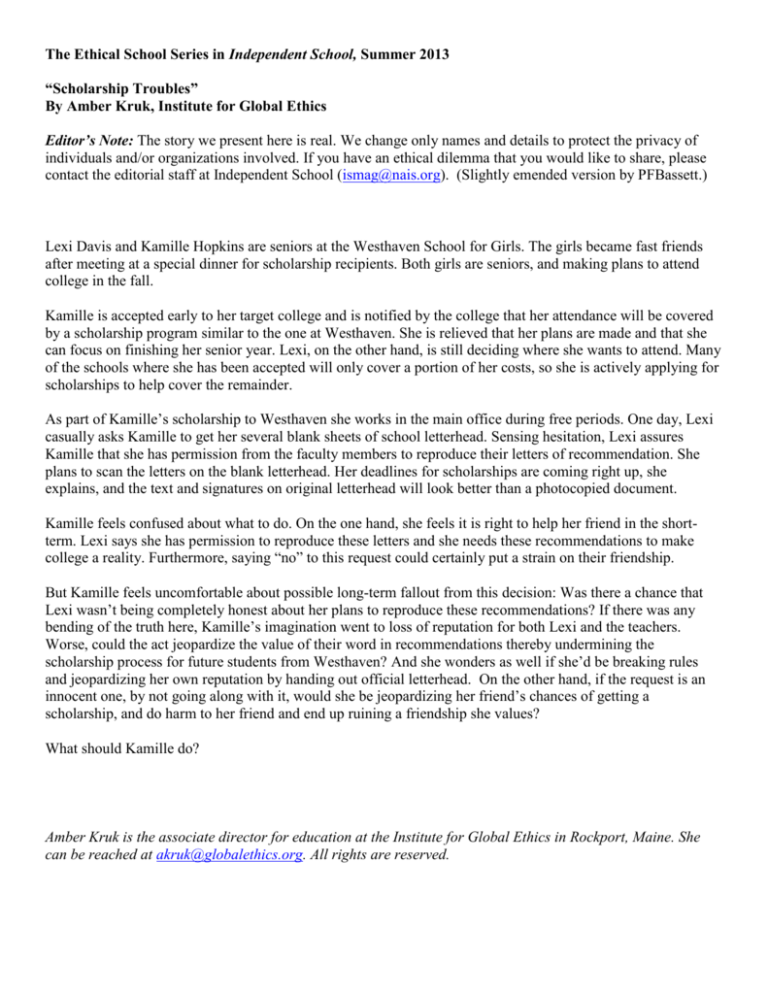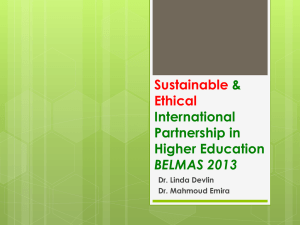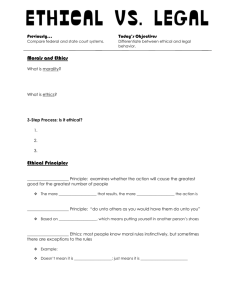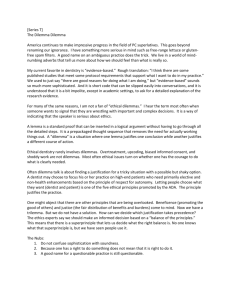
The Ethical School Series in Independent School, Summer 2013
“Scholarship Troubles”
By Amber Kruk, Institute for Global Ethics
Editor’s Note: The story we present here is real. We change only names and details to protect the privacy of
individuals and/or organizations involved. If you have an ethical dilemma that you would like to share, please
contact the editorial staff at Independent School (ismag@nais.org). (Slightly emended version by PFBassett.)
Lexi Davis and Kamille Hopkins are seniors at the Westhaven School for Girls. The girls became fast friends
after meeting at a special dinner for scholarship recipients. Both girls are seniors, and making plans to attend
college in the fall.
Kamille is accepted early to her target college and is notified by the college that her attendance will be covered
by a scholarship program similar to the one at Westhaven. She is relieved that her plans are made and that she
can focus on finishing her senior year. Lexi, on the other hand, is still deciding where she wants to attend. Many
of the schools where she has been accepted will only cover a portion of her costs, so she is actively applying for
scholarships to help cover the remainder.
As part of Kamille’s scholarship to Westhaven she works in the main office during free periods. One day, Lexi
casually asks Kamille to get her several blank sheets of school letterhead. Sensing hesitation, Lexi assures
Kamille that she has permission from the faculty members to reproduce their letters of recommendation. She
plans to scan the letters on the blank letterhead. Her deadlines for scholarships are coming right up, she
explains, and the text and signatures on original letterhead will look better than a photocopied document.
Kamille feels confused about what to do. On the one hand, she feels it is right to help her friend in the shortterm. Lexi says she has permission to reproduce these letters and she needs these recommendations to make
college a reality. Furthermore, saying “no” to this request could certainly put a strain on their friendship.
But Kamille feels uncomfortable about possible long-term fallout from this decision: Was there a chance that
Lexi wasn’t being completely honest about her plans to reproduce these recommendations? If there was any
bending of the truth here, Kamille’s imagination went to loss of reputation for both Lexi and the teachers.
Worse, could the act jeopardize the value of their word in recommendations thereby undermining the
scholarship process for future students from Westhaven? And she wonders as well if she’d be breaking rules
and jeopardizing her own reputation by handing out official letterhead. On the other hand, if the request is an
innocent one, by not going along with it, would she be jeopardizing her friend’s chances of getting a
scholarship, and do harm to her friend and end up ruining a friendship she values?
What should Kamille do?
Amber Kruk is the associate director for education at the Institute for Global Ethics in Rockport, Maine. She
can be reached at akruk@globalethics.org. All rights are reserved.
This Student’s Resolution in the Actual Case
In the end, Kamille decides that she can’t help her friend. Even though Lexi’s request could be perfectly innocent,
Kamille worries that too much harm could be done to too many people if her worst fears are realized.
Seminar/Workshop Activity on Ethical Reasoning
1. Did Kamille “do the right thing”?
2. Right vs. Wrong: What systems do we rely upon to determine right vs. wrong?
3. What situations in life can you think of that represent ethical dilemmas? (What is the definition of a dilemma?)
4. Is this case study a simple right vs. wrong situation? If so, why is Kamille having such a hard time deciding
what to do? Or is it a right vs. right dilemma?
5. Can you think of any situations where lying, cheating, or stealing are morally justifiable? How about killing?
6. What ethical dilemmas can you think of that confront secondary school students in their lives? In your school?
7. Can you think of a more than one way to finish this sentence that might be a “rule of thumb” for you to make
thoughtful ethical decisions when faced with difficult decisions?: “I will ‘do the right thing’ if I always….”
8. Can you see where there might be competing rights in play depending on the situation?
9. The deepest ethical dilemmas are “right vs. right” decisions (Source: see Institute for Global Ethics website,
www.globalethics.org)
i.
individual vs. community: e.g., separate the disruptive child who needs socialization skills from
his cooperative learning team that is being held back and exasperated by him? Expel on first
offense?
ii.
truth vs. loyalty: hold a confidence of a self-destructive behavior or report it? “Narc” on a friend
to support the honor code?
iii.
short-term vs. long-term: The Palace Thief / Emperor’s Club example of making an exception in
the short-term (re-grading a paper for a student you think you can “re-direct”) in the hope of long
term salvation?
iv.
justice vs. mercy: after putting in a “zero tolerance policy” and suspending the two boys for
fighting in the schoolyard, finding out a third boy was involved, because of persistent taunting
and bullying, who begs not to be suspended since he says his family will be shamed and he beaten.
10. Institute for Global Ethics (IGE: www.globalethics.org) three ethical reasoning systems:
i.
ii.
iii.
Rules-based test (PFB note: rooted in the “justice” ethos Immanuel Kant’s “categorical imperative”:
“Do that which you would want to see universalized” or “The Golden Rule” and 10 Commandments)
Ends-based test (PFB note: rooted in John Stuart Mills’ utilitarianism, “Do that causes the greatest
general good”)
Care-based test (PFB note: rooted in Carol Gilligan’s caring ethic: “Do that which a caring and
empathetic person would do.”)
N.B.: PFB Gender Survey Results on Ethical Dilemmas: tennis game; spy case
11. Four-way test for schools making crisis decisions:
i.
What’s your gut tell you to do? (empathy)
ii.
What does your lawyer tell you to do? (justice)
iii.
What will be the headline in the local newspaper? (greater good)
iv.
What message will you be sending to the student body? (hypocrisy policy)









